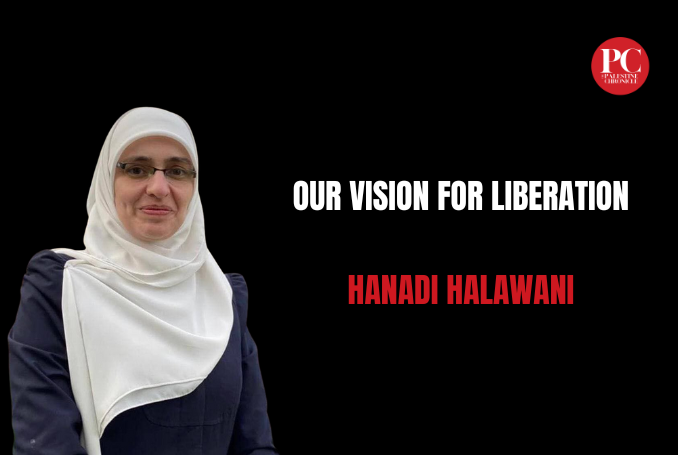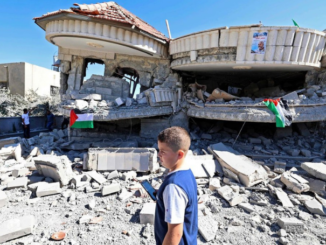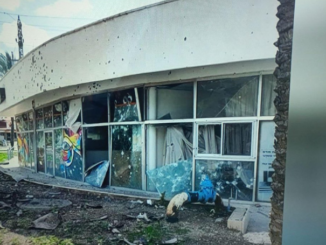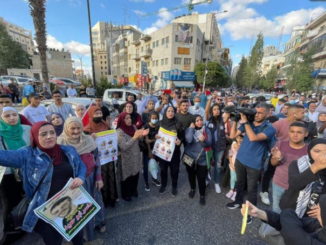
Hanadi Halawani is not an ordinary ‘prisoner’. She has been detained numerous times in the past, simply because she has, for years, led a community group, mostly of Palestinian women, in defense of Al-Aqsa Mosque.
Recently, an important volume, co-edited by Ilan Pappé and Ramzy Baroud, has given a platform to Halawani, along with many other Palestinian community leaders, to speak about their lives, their struggles, and their vision for a liberated Palestine.
The essay below was Hanadi Halawani’s contribution to Our Vision for Liberation: Engaged Palestinian Leaders & Intellectuals Speak Out (Clarity Press).
We are the Murabitat: Planting the Seeds of Resistance in Occupied Jerusalem
I was born in the year 1980, in Wadi Al-Joz, in the city of Al Quds, Jerusalem. I grew up there. I did my elementary and middle school education at the Arab Children’s House, which was established in the year 1891 by Hind al-Husseini to look after Palestinian orphans who survived the Deir Yassin massacre. After I finished, I joined al-Ma’munia School, where I did my high school education, before enlisting at the Al-Quds Open University, where I graduated with a degree in Social Development. Currently, I am finishing a Master’s Degree at Birzeit University focusing on Democracy and Human Rights.
I spent most of my childhood living with my family in my grandmother’s house in Jerusalem. My early memories have often centered around her as she took me with her everywhere. My grandmother is a survivor of the 1948 Nakba and the 1967 Naksa. In her heart, she carried a great deal of sadness and so much resentment for the Israeli occupation. She always looked at the Al-Aqsa Mosque with the hope that one day it will be liberated as part of the liberation of the whole of Palestine. I remember her many war stories, always rife with a mixed feeling of agony and hope of an assured victory.
She always took me with her to Al-Aqsa. First, we would rest in the shade of her favorite tree. Then, we would stand up where she would hand me an empty bag so I would walk around the large vicinity of the holy shrines and collect every speck of garbage I would encounter. I did so with much enthusiasm, though she would remind me now and then that sanctifying Al-Aqsa compound is not just about cleansing it of trash but also of the violent settlers and armed soldiers who would raid the space so very often, fire at will and disturb the serenity of the otherwise peaceful place.
lsraeli occupation authorities extend the arrest of Palestinian teacher Hanadi Halawani who was detained yesterday. The attached video shows the cruel treatment she is receiving from the occupation soldiers; an observation that can’t go unnoticed. pic.twitter.com/wWfNgKgXME
— TIMES OF GAZA (@Timesofgaza) January 25, 2023
My grandmother’s love for Al-Aqsa seemed to balance out her many fears about the fate of Palestine. Al-Aqsa, for her, was not just a holy place, but a symbol of something much larger and more profound. Once she heard me singing. She stared at me with teary eyes, saying that “I pray that one day I’ll hear your melodious voice reciting the Quran at Al-Aqsa Mosque.” I inherited my love for Al-Aqsa from my grandmother. She passed away but she left us with that deep sense of responsibility for Al-Aqsa and for Palestine.
I was only 17 years old when I married Yasin Makawi, a young man from Jerusalem who, too, inherited a legacy of love, warmth but also suffering. Together, we raised a family, which one day will carry on with our mission in this life.
I was still a student at Al-Quds Open University when I had my eldest daughter, ‘Ala and my son Mahmoud. Managing two children, school requirements and life in an occupied city was not an easy feat. But that period has taught me to be stronger, to manage my time, and to cope with life while carrying heavy burdens. After that, my son Ahmad was born and finally Hamza. By the time Hamza was born, I was fully committed to a life dedicated to Al-Aqsa Mosque, first as a student, then as a teacher and an activist.
Linking my life struggle to Al-Aqsa began when I became intensely involved in acquiring high certificates in the recitations and teaching of the Quran. Initially, I was motivated by my grandmother’s wish that one day my voice can resonate throughout Al-Aqsa compound with the words of God. That wish came true when I learned that the Islamic Movement in occupied Palestine intended to expand an existing program known as Terrasses of Knowledge, which was initially limited to men only, and eventually expanded to include women. That was in 2010, and despite my humble education and knowledge at the time I still applied for the position.
Israeli police roughly arrest two Palestinian religious leaders Hanadi Halawani and Aida Al-Sidawi in the Old City of J’salem | via @qudsn pic.twitter.com/38cua3NJZj
— Sarah Wilkinson (@swilkinsonbc) October 2, 2023
I knew that my qualifications did not measure up to many of the women who applied to the position of a teacher in the program. There was a strong-willed woman, with high education, who was also the wife of a Palestinian martyr; another who has been a religious preacher for many years; a third with unmatched certifications and long experience. As for me, I carried the wish of my grandmother, her love, now my love, of Al-Aqsa. I was armed with hope as I attended the job interview. I told the person who interviewed me that “I know that my certificates and papers do not meet the minimal requirements for the job, but I have something unique to me and that is, wanting to turn words into action, for the sake of Al-Aqsa and our beloved Palestine.” Hours later, I received a telephone call where I was told that I had been selected as a teacher in the Terrasses of Knowledge program. My job description included the teaching of the Quran to young children.
I began my new role as a teacher on January 1, 2011. Little did I know that this was not the beginning of a teaching career only, but the start of a long road that would eventually designate me as a Murabita – steadfast woman – whose main mission in life is to stand guard against all attempts to denigrate Al-Aqsa and to deny Palestinian rights in the occupied city.
It is not easy for a mother to be involved with an initiative that begins at 7:30 in the morning and carries on for much of the day. This hardship becomes more pronounced when that mother, in this case myself, but many others, would have to pass through various Israeli military checkpoints that are intentionally designed to keep us out. But it was only a matter of time before the female component in this project became a dominant one. In the beginning I taught a small circle of students that grew in number compelling us to divide it into two. The number of students, however, continued to grow and along with it, the circles of knowledge. Israeli soldiers watched us with alarm, and began a campaign of harassment that lasted for years. They would come into our classes and would start zooming cameras into the faces of teachers and students and snapping photos. Then, for no reason, they would collect the ID cards, hold them for a while and write down the names of the attendees.
Some of the women involved in the program were beginning to worry. Some wanted to leave as they did not anticipate the ferocity of the Israeli response. I remember standing amongst them once and saying this: “Let’s imagine ourselves all in a bus that is taking us to a journey in a place far away. As we get fatigued by the arduousness of the journey, some of us may choose to leave. The ones who leave first pay the lightest of price, but by choosing to abandon the rest of us, the journey becomes harder for anyone else. If we stay together, we can share the hardship until we reach our final destination. Sisters, this journey we have embarked on is our path towards liberation. If we choose freedom for all of us, we have to share all the hardships equally.” Thankfully, we stuck together.
Israeli occupation forces detain Palestinian woman activist Hanadi Halawani from her parent's home in occupied #Jerusalem, today. L pic.twitter.com/1q6P9GQS8e
— Aya Isleem 🇵🇸 #Gaza (@AyaIsleemEn) October 1, 2020
Hundreds of children were registered in the various programs. It was a beautiful sight watching these promising young faces learning about their religion, their culture and their identity, standing up for one another, especially when the soldiers decide to bully, deny entry or arrest any of them. They would all gather around the checkpoint and chant to let them through; at times, the soldiers, overwhelmed and bewildered, would release the detained children.
Sometimes, mothers and children would attend school together, some learning how to read and write, and others taking on more advanced subjects and areas of knowledge. With time, I became the director of the whole program, and I began seeking young energetic girls to help me in the project. When we would gather at Al-Aqsa, we would be like a beehive, each teacher or volunteer is dedicated to a specific subject and a specific circle of knowledge. At times, my job would be moving me from one circle to another, directing, encouraging, consoling, and leading. The girls, then, called me the butterfly of Al-Aqsa. I liked that nickname.
But adjacent to our struggle for knowledge, there was another ongoing battle with the Israeli occupation. Whenever the soldiers tried to make life difficult for us, we would find ways around these restrictions; when they tried to scare us, we remained fearless and steadfast. When they tried to threaten us, we wouldn’t move an inch. Nothing they have done has changed our commitment to the educational program. Fear could not find its way to my heart, because in my heart I had my love for Palestine and for my grandmother – her resolve, her hope and her determination.
In 2013, I was deported from Al-Aqsa following an Israeli court order. The deportation order was for two months. I saw in that unwarranted action an opportunity to acquire yet more knowledge. So, I traveled to Jordan where I underwent several programs and obtained several certifications related to my field. Shortly after I returned to Al-Aqsa, I was deported again for fifteen days. Yet, I returned once more, this time with greater awareness that the reason behind all of these restrictions and deportations is to ensure that armed Jewish settlers, who constantly raid Al-Aqsa, do not meet any resistance on their abrasive and often violent journey. So, this is what I did: I changed the location of the knowledge circles to dot the path of the armed settlers.
The settlers, who raid Al-Aqsa under the protection of heavily armed soldiers, began their so-called tours at the Moroccan Gate (Bab al-Magharib), before proceeding to the Al-Musalla Al-Qibli, then to the Marwan-e-Masjid before proceeding to the Mercy Gate (Bab Al-Rahma) with the hope of reaching the Fountain of Qayt Bay (Sabil Qaitbay) to drink from its water. Finally, they often leave using the Chain Gate (Bab Al-Silsila). But following my rearrangement of the knowledge circles, wherever they went, they found a group of Palestinian women studying, reading and writing, reciting Quranic verses and chanting against the Israeli military occupation. Even the Mercy Gate, which, till then was somewhat abandoned – the vacancy of which allowed the armed settlers more space to gather and organize – became a space for Palestinian Muslim women to learn and teach. And if the armed settlers decided to go to the holy Dome of the Rock to pray at the Muslim religious sites, we would stand in front of them like a wall. We would raise our holy books in tandem, and we would chant, together, “God is greater”. Frankly, we all knew that the sight of women is believed to spoil the prayer of many of these religious Jewish men. So, intentionally, we would stand in front of them as they attempted to desecrate our holy shrines. And every time, we spoiled their prayers.
The Israeli authorities have issued orders banning the two Palestinian, Jerusalemite activists Hanadi Halawani and Khadija Khwais access to the holy al-Aqsa Mosque. pic.twitter.com/pwZRb3rCET
— Aya Isleem 🇵🇸 #Gaza (@AyaIsleemEn) September 30, 2019
For a while, they used the tactic of stealing our chairs. So we replaced the chairs with rugs. They stole the rugs, too, so we sat on the bare floor. The effort of these Murabitat, the steadfast women, forced the extremists to change the path of their raids by conducting symbolic visitations where they would enter from the Moroccan Gate and quickly leave from the Chain Gate without desecrating much of the compound, as they had always done.
But a more serious crackdown began in 2014 where many of the Murabitat were violently arrested, some jailed and others deported for long periods of time. Instead of giving up, we moved our mobile school outside of the Chain Gate. I would gather the women around me, follow up on their studies, and finish by reading the Quran together. Whenever the settlers triumphantly exited through the Chain Gate, we would be waiting for them, chanting Allah Akbar, raising our holy books in their faces, completely unafraid of their automatic rifles and unintimidated by their obscene language.
As I watched more and more women being denied access to the mosque, we decided to reach out to the tourists who visit Al-Aqsa in large numbers on a daily basis. We all wore similar colored t-shirts with the following line, “Do you know why we are here? Ask us”. We explained to them in both Arabic and English why the soldiers have denied us the right to pray, learn and teach in the holiest of our religious shrines. Eventually, the soldiers attacked us, confiscated our placards and forced us to pay a large fine for wearing our t-shirts. Still, we kept coming back, talking to everyone who is willing to hear about the injustice of the Israeli occupation. Frustrated by our relentlessness, the soldiers began attacking us with unprecedented violence, beating us with heavy sticks, throwing teargas in our midst, spraying us with gases that burned our eyes, throats, and irritated our skin. They punched and kicked women, young and old. They dragged us down the street, they stepped on us, they spat, and used all kinds of obscenities. But we kept coming back.
In 2015, the Israeli military released what they called the blacklist. These were women who were no longer allowed to enter Al-Aqsa Mosque compound. My name was the first on the list, and everyone else who was ‘blacklisted’ received all kinds of harassments, arrests, various types of punishment, including house arrests and, at times, torture. I told the women on the list that this is a ‘golden list’, as it contains the most powerful and the most effective of all women, whose work and activism have frightened the supposed ‘invincible army’. In that very year, I was told that I cannot step foot in Al-Aqsa during the holy month of Ramadan. Considering the significance of this holy Muslim month, and the historic rapport between Ramadan and Al-Aqsa, the decision was meant to break my will. My answer was breaking the fast outside the Chain gate in a Ramadan Iftar like no other.
Israeli occupation forces detain prominent Al-Aqsa Mosque activist and teacher Hanadi Halawani at the entrance to the holy site in occupied #Jerusalem, today. pic.twitter.com/2qL3m54i3s
— Quds News Network (@QudsNen) June 16, 2021
The sisters and I cooked a massive amount of Maqluba, an unmatched Palestinian dish loved by all. The entire meal was prepared in the street and it was not only meant to serve the Murabitat who were deported from Al-Aqsa but was smuggled to those who were also inside. It was the first but definitely not the last time that the Maqluba feast became a regular occurrence in and around Al-Aqsa. Understanding the significance of our national dish to our collective identity, the soldiers would interrogate us about the reasons why we are always preparing this specific kind of food. Within weeks, we were making court appearances, as we were literally investigated for making Maqluba.
2015 was a particularly difficult year for the women of Al-Aqsa. We were treated with the same kind of violence and subjected to the same kind of torture, to which Palestinian men were subjected. We began spending long painful nights in the dungeons of occupation. This suffering continued until an Israeli court decided by the end of the year to ban the Islamic Movement altogether, both in occupied Jerusalem and in Palestine ‘48. Their aim was the destruction of the Terrasses of Knowledge program, which had strengthened the relationship between Palestinian youth and Al-Aqsa, in fact, of all of Jerusalem’s holy shrines. Unfortunately, the program itself had to stop. But that was not the end of the road for me. Guided by my grandmother’s love and wish to -never to abandon Al-Aqsa, I continue to find ways to empower women so that we may continue to play our critical role in the struggle for freedom.
The Israeli occupation continued to target me, despite the violent closure of our educational program. In 2016, I was arrested during the trial of one of the teachers involved in the Terrasses of Knowledge program. They interrogated me for seven days, which I spent mostly in shackles, being transported through the Bosta – the armed prison vehicle – between my prison cell and the interrogation room. They were days of constant humiliation and the insistence on the degrading search where one would have to be stripped naked every time. This was not the first, nor the last of my detentions. At times, they placed me with convicted Israeli criminals to frighten me and to break my spirit. At other times, they placed me in solitary confinement, a tiny cell that felt as if it was a filthy toilet. My interrogators seemed to enjoy humiliating me, making fun of me and even calling me crazy. They often pulled off my hijab and forced me to attend court sessions without it. Once, and without any justification, they forced me to remove all of my clothes and sit in a small room surrounded by cameras. They were only 15 minutes but it felt as if it was a lifetime.
In the following months, the Chain Gate itself was shut down with iron blocks and barbed wires, so the women and I relocated our protests to the Hitta Gate (Bab al-Hitta). But, inevitably, our numbers began to dwindle. By Ramadan 2017, I was the only woman still protesting. I eventually relocated to a new spot, between the Hitta Gate and the Lion’s Gate (Bab al-Asbat). This new spot is still there and the number of protesters is once more growing.
True, our educational program had been disrupted and many of the women were, once again, consumed by their own challenges in life, but my message and my mission did not stop. I took the message of Al Quds, Jerusalem, and the struggle of all the Murabitat to many countries around the world, beginning in Jordan, then Kuwait, Indonesia, Bahrain, Turkey, and elsewhere. Wherever I went, my audiences were always worried about the fate of Jerusalem and every time, I would reassure them that we Palestinians will continue to stand at the frontlines of resistance against Israeli military occupation.
Upon my return to Jerusalem, I contacted many of my students, teaching them what I can and whenever possible. Even that, from Israel’s perspective, was too dangerous, so the Israeli occupation continued to make my life difficult, limiting my movement and denying me the right to travel. First, I was blocked from traveling for three years, and as soon as I regained that right, an Israeli court imposed it again in 2020. My family and I are denied health insurance and constantly forced to pay heavy fines for things that make no sense, simply to punish me. At any given day, I would be denied entry, either to the West Bank or to Jerusalem’s Old City, or placed under house arrest in lieu of prison time. But the most painful of all punishments is when Israeli soldiers break into my home and savagely begin to destroy everything in their way, my kids’ computers, desks, and beds. And with every break-in, they would confiscate my papers and my certificates, and they would drag me in handcuffs, often late at night, to an Israeli prison. On one of these occasions, I glanced into the street to see a seemingly endless stream of Israeli vehicles, police cars and special forces. The military caravan that took me to be interrogated was so loud and massive as if I was a dangerous criminal. In the interrogation room, I asked one of the Israeli officers why was it necessary for them to deploy such a large force to arrest an unarmed woman. He answered with a smirk, “But you deserve more than this, you are the most dangerous woman to Israel’s security.”
Media coverage| Israeli police officers brutally assault and detain Palestinian murabita Hanadi Halawani in the old city of Jerusalem. pic.twitter.com/76A1PiR4XO
— Quds News Network (@QudsNen) October 17, 2022
But I am going nowhere. Our rightful struggle cannot be negotiated and it will continue, no matter the passing of the years. And if we cannot fulfill our mission in this life, another generation of Palestinians will. I know the price will always be high because dignity, freedom and victory are precious. Now, I am back at the university, studying Democracy and Human Rights. I want to take my message, the message of the Murabitat in the streets, to every international forum that is willing to hear our pleas. I try to take every opportunity to address the world, whether online or whenever I am allowed to return to my spot outside the Al-Aqsa compound. My message to the Israeli occupation is that we will never give up and my message to the new generation of Palestinian Murabitat, “Do not be scared, and carry on with your noble fight for freedom.”
Sometimes, I feel that my grandmother’s heart is beating in my chest and that I am a mere messenger, carrying her message to the world. My grandmother’s legacy has taught me that when you plant a seed, do not worry if you’re not the one who eats from the fruits it bears. Our fight for freedom is intergenerational, my grandmother planted a seed in my heart and I am planting the seeds in my children’s hearts. The more I carry on with my fight for freedom, the more courageous I feel, the more unmoved, unafraid. I feel that God is always with me, He gives me courage and strength. Even when I sit alone outside the walls of Al Aqsa, surrounded by hordes of soldiers, inside of me, I feel the power of Palestine, all of Palestine, and her people.








